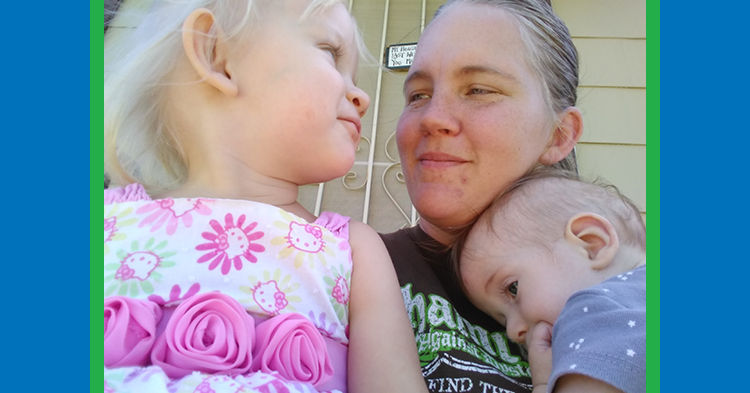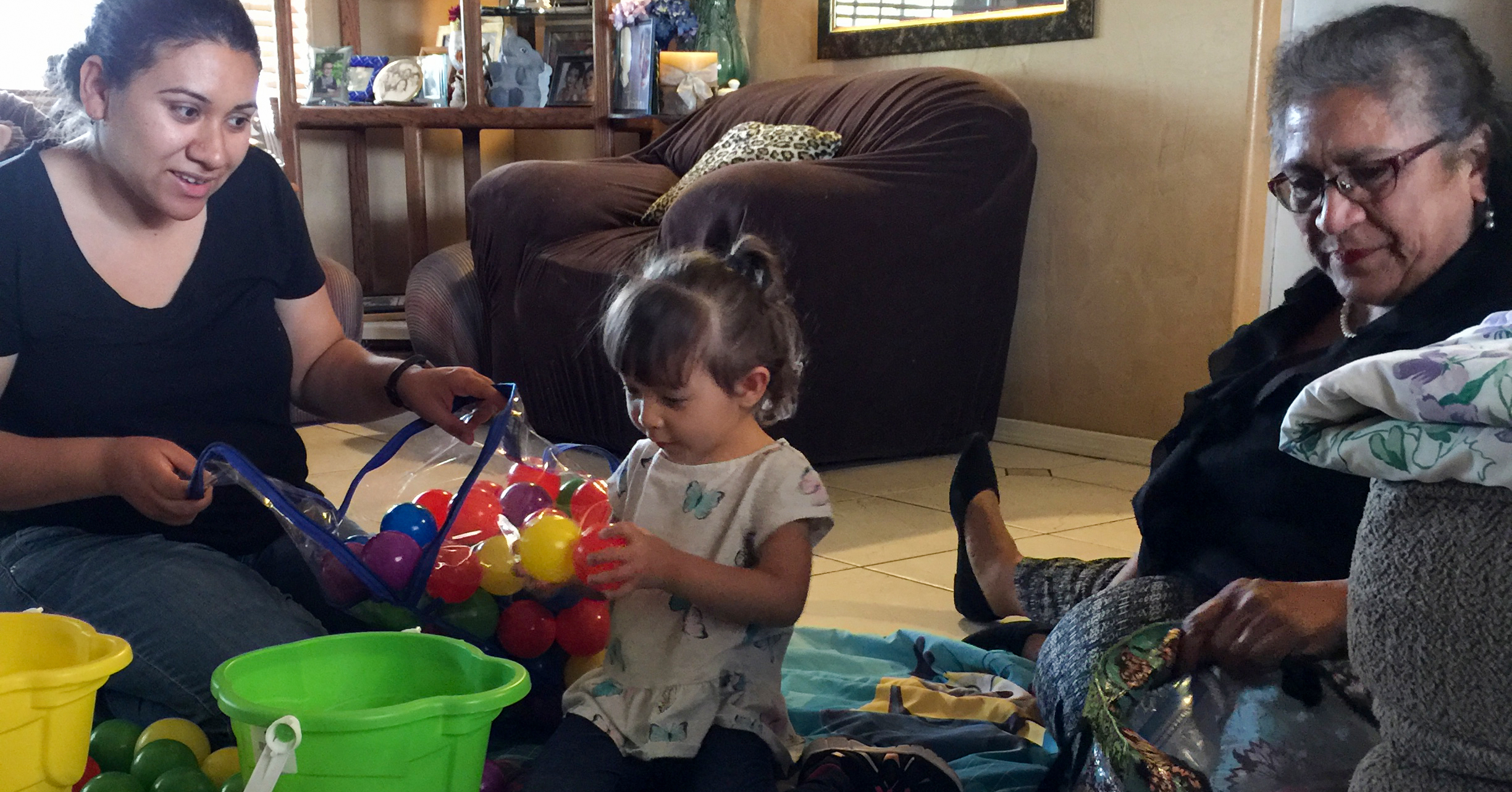This strategy strengthens and improves the coordination of services and programs for children birth to age 5. Through coordination and collaboration efforts, it improves and streamlines processes including applications, service qualifications, service delivery and follow-up for families with young children. The intent is to reduce confusion and duplication for service providers and families.
Regions funding this strategyFeatured Stories
Funding Plan Highlights
Colorado River Indian Tribes
First Things First facilitates cross-regional service provider meetings in a countywide effort between providers serving families in La Paz County and throughout the Colorado River Indian Tribes Region. The purpose of the service provider meetings is to improve service coordination between La Paz County and the tribal community. The service provider meetings, convened by the region’s program coordination specialist, give a space where service providers can share their services, contact area and trainings and identify areas of possible collaboration. Within in the first year of meeting, two goals have emerged. The first goal is to establish an overall resource list for other providers to share with families and to identify where they can direct families to resources. The second goal is to establish an overall referral system with local and countywide service providers to provide wrap-around services to families. The referral system is currently in development to enhance this collaborative approach to screening, identifying and providing intervention and resources to young children.
Colorado River Indian Tribes, Hualapai Tribe and La Paz/Mohave
The La Paz/Mohave Regional Partnership Council, the Colorado River Indian Tribes Regional Partnership Council and the Hualapai Tribe Regional Partnership Council focus on resource coordination and referral through a multi-regionally funded staff person implementing a cross-regional Service Coordination Strategy. The staff person is a program coordinator specialist, and has been successful in bringing together providers within the different communities of the three regions. This past year has been dedicated to identifying services available in La Paz and Mohave counties, existing collaborations and their successes, the gaps that prevent families from connecting with services, and opportunities for collaboration and coordination between service providers. Work groups have been formed to develop a coordinated referral system among providers and identify available resources for families and professional development. The program coordination specialist also participates in the Statewide Partners Group (SPG) meetings in order to bring a regional perspective to statewide discussions on early screening and intervention. The SPG is a collaborative learning network of individuals and organizations who will provide feedback, expertise and input to inform the overall work of a comprehensive system to meet the developmental needs of children, especially those who have a mild to moderate developmental delay.
The three regions also host an annual Tri-Regional Forum with the La Paz/Mohave, Hualapai Tribe and Colorado River Indian Tribes regional councils. The Tri-Regional meeting is an opportunity for regional council members to continue discussing how the regions can work more collectively and leverage the work of the three regional councils.
Maricopa Regions
Find Help Phoenix, an English/Spanish online directory that was started with funding from the Northwest Maricopa Regional Council, provides information on more than 2,000 free and low-cost resources to families in Maricopa County. Maricopa County Department of Public Health, who implements the strategy on behalf of the First Things First regions in Maricopa County has implemented a YouTube, Facebook and bilingual billboard ad campaign to efficiently connect vulnerable populations to resources. A new partnership between the county health department and the Crisis Response Network is increasing outreach and awareness activities and improving the online resource directory website.
Navajo Nation
The Service Coordination Strategy is working to build the Navajo Nation early childhood system in the areas of service delivery enhancement through community referrals, kindergarten transition coordination and early intervention coordination. There is a dedicated, full-time FTF staff person who was hired in the second half of SFY19 to conduct strategy implementation. The service coordinator began this work by developing an action plan.
The most successful achievement in this area to date occurred by partnering with the Navajo Nation Office of the President and Vice President, including the Office of the First Lady, to host the first Diné Early Childhood Summit. The goal of the summit was to start the initial work of identifying and eliminating barriers in the early childhood system by convening partners to address the needs of children and families in the region. The summit was the first of its kind and convened stakeholders from the Navajo Nation Office of the President and Vice President, Navajo Nation Council, Navajo Nation Head Start, Navajo Nation Division of Social Services, Navajo Nation Child Care and Development Fund, Navajo Nation Department of Behavioral Health and Mental Health Services, Navajo Nation Treatment Centers for Children and Families, Navajo Nation Women, Infants and Children, IHS/638 health care centers, public schools and FTF grant partners to have conversations on how to better serve children and families. Evaluations indicated an average of 91 percent of attendees said the summit helped to increase their understanding of gaps, needs and challenges in the Navajo Nation early childhood system. A report, including key findings and recommendations, will be distributed to all early childhood stakeholders. The report will serve as the guiding document for planning the annual summit with the broader, longer term goal of increased coordination and collaboration to continue early childhood system building.
Since implementation of the Service Coordination Strategy began, it has helped to establish or maintain relationships between the regional council, tribal leadership and partners in the education, health and social service fields (tribal and non-tribal). Through these established and maintained partnerships, the regional council has increased communication and regular meetings with early childhood stakeholders within the region to address gaps in the system.
Pascua Yaqui Tribe
The Pascua Yaqui Tribe Regional Council is implementing two strategies that are working together to support the educational and health needs of 60 young children that are not currently enrolled at the Ili Uusim Mahtawa’apo Pascua Yaqui Head Start. Throughout the school year, the Service Coordination Strategy links resources and services to support the health and well-being of 60 children, 2 to 4 years old, who are anticipated to participate in the Summer Transition to Kindergarten program in the summer.
Pima South
The Pima South Regional Partnership Council prioritizes building capacity of the early childhood system and leveraging opportunities for young children and families. Increasing coordination and collaboration is completed by planning, developing and delivering family support services to meet the needs of families and leveraging available resources. Seven community volunteers, known as community connectors, work to share information about local services and supports to families in rural or isolated areas of the region. A stipend is offered to the community connectors to cover travel costs and their time spent supporting families with young children. Each community connector is recognized as a trusted community individual within their community. Some roles include raising awareness of available services and supports within or nearby the community, building community relationships with community stakeholders and helping address community challenges and barriers that impact young children and families.
The Family Engagement Network, is a collaboration between First Things First Pima North and Pima South Regional Partnership Councils, United Way of Tucson and Southern Arizona, Pima Community College, Pima County Arizona @ Work, Primavera, The Women’s Foundation of Southern Arizona, Job Path, and The MAMA Project. The goal of the Network is to build a collaborative system that mitigates barriers for families in Pima County accessing a workforce development program. The ultimate outcome of this system building is that parents are acquiring higher education and a career in a high demand field, which will raise them out of poverty, while their young children simultaneously have access to high-quality early learning and support in their most formative years.
Southeast Maricopa
The Mesa Early Learning Network is now in its third year of implementation. The group has been moving up the continuum of collaboration, with many now coordinating with one another. This year, the group has moved from relationship and trust building into shared action. It has developed a strategic plan and begun implementing action steps toward their shared goals, which include launching a warm referral process and completing a communication plan. Many of the organizations represented have shared the benefits of getting to know some of the other programs in the region and especially building relationships with staff from those programs participating in the network. This has facilitated referrals from one program to another, making it easier for families to not only know about other services they can benefit from, but actually access those needed services. For example, the Mesa K Ready program sent families that did not qualify for their program to Parent Partners Plus (the Coordinated Home Visitation program.
Yavapai
When the regional council identified this as a strategy to implement beginning in State Fiscal Year 2019 (SFY19), it noted that families in the region often had difficulty connecting to a wide array of resources. The regional council wanted to focus on root causes of families not being able to receive needed services and address the broader social determinants of health affecting the development and well-being of children. As the regional council gleaned community input on potential areas of focus for this work, it learned of a variety of needs and opportunity assessments that had already been performed. In addition, it also learned that a number of well-positioned community partners were beginning to address many of the identified needs in areas such as transportation, food security and affordable housing. Accordingly, the regional council chose not to fund any work under this strategy until there was shared agreement on specific opportunities to advance the early childhood system in the region or clear next steps for identifying such opportunities.
During SFY20, the regional council chose to re-visit efforts to implement its Health Systems Change Strategy and strengthen the system of supports available to families in the region. The regional council wishes to hire a consultant to identify specific opportunities for the regional council to improve the ability of families in the Yavapai Region to connect with needed health and other resources to meet their young child’s needs. The consultant will:
- Conduct a meta-analysis of available regional data, including previous needs and opportunities assessments conducted.
- Assess opportunities for collective impact to improve access to services and supports for families by convening key informants, interviewing stakeholders and conducting focus groups.
- Explore Information Technology (IT) infrastructure needs by convening entities that use some form of IT-based resource and referral system to identify need and trends.
Yuma
The Yuma Regional Partnership Council and staff act as the backbone agency for The Yuma County Early Childhood Collaborative (YCECC). The YCECC brings leaders together all focused on supporting and advancing the Yuma County early childhood system. This strategy brings leaders focused on supporting and advancing the collaborative work in Yuma together to create a shared vision and mission, strengthen collaboration and increase knowledge and understanding of the Yuma early childhood system. The leadership team of the YCECC meets every other month to develop and execute quarterly meetings that highlight needs and success in our region.
Based on the guidance from three town halls, the regional council identified the need to add the Service Coordination Strategy. As part of the new strategy, a program coordinator specialist position was created. The role of the specialist will be to increase collaboration among system partners to maximize resources and effectiveness, so families are referred to appropriate resources. This coordinator will work with partners to identify resources and their accompanying locations in Yuma County. It will also reduce confusion and duplication for service providers and families. The specialist is also creating a resource guide for community professionals. This resource guide will provide a one-page summary of every program in the region.
Strategic Partnerships and Investments Highlights
Pinal
The Pinal Early Childhood Coalition (PECC) is a collaborative of more than 30 community agencies that identify needs and opportunities within Pinal County and utilize a strategic plan to address those needs and strengthen the entire early childhood system. The Pinal Family Resource Guide has been a signature strategy of PECC since its first printing in 2012. Updated annually, this guide has become a relied on resource throughout the community for a wide range of service providers and agencies that interact with families with young children, ensuring that families have access to services.
The Pinal Regional Partnership Council places a high priority on partnering with law enforcement agencies to support families involved in the criminal justice system. Law enforcement agencies utilize the Pinal Family Resource Guide to better serve the community. As reliance on this valuable resource grew for other partners as well, so did the community’s interest in supporting this important effort. In 2019, the Pinal Family Resource Guide received its first sponsorship by Banner Hospitals. In the next two printing cycles, sponsorships grew with 11 agencies sponsoring the 2021 guides, covering the majority of printing costs. The Pinal Early Childhood Coalition in partnership with the Pinal Regional Partnership Council will continue to explore new partnership and sponsorship opportunities, with the goal of creating a resource guide that is completely funded by the community.
Find more details about strategies related to Family Support in the FTF Strategy Toolkit.




